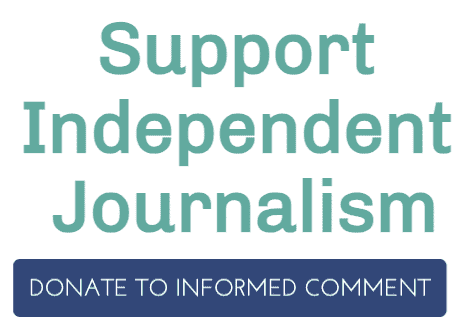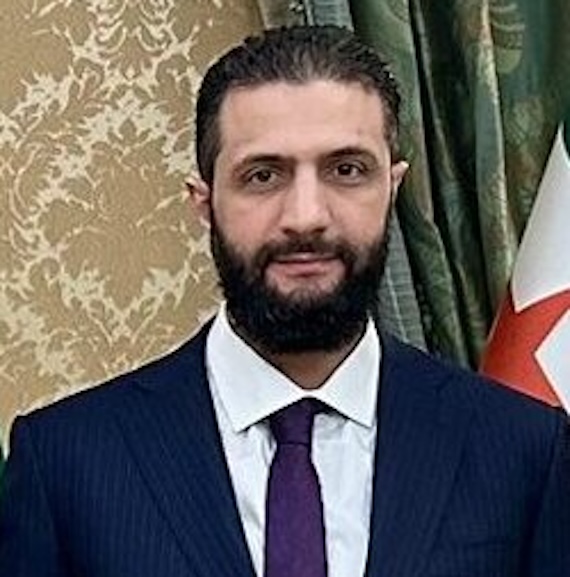Ann Arbor (Informed Comment) – President Trump met behind closed doors on Monday with President Ahmad al-Sharaa of Syria for about an hour. Secretary of State Marco Rubio also met with his opposite number, Syrian Minister of Foreign Affairs Asaad Hassan Al-Shaibani.
One of the topics of discussion, according to the Syrian press, was ways to achieve a security pact with Israel, which has intensively bombed Syria since last December’s revolution and has occupied new Syrian territory beyond the Golan Heights. The new government’s interest in using American good offices to get the Israeli government to cease attacking it has been criticized, since it came during the Israeli genocide against Gaza, about which al-Sharaa has not been vocal.
Israel gave al-Sharaa’s al-Qaeda-linked Succor Front some medical and other aid during its fight with the Baathist regime of now-deposed dictator Bashar al-Assad, since I guess it really is true in the Middle East that the enemy of my enemy is my friend.
Trump said of his Syrian counterpart, “He has had a rough past. And I think, frankly, if you didn’t have a rough past, you wouldn’t have a chance.” Trump said he wanted to see Syria succeed.
Al-Sharaa agreed to join the 90-nation international coalition against the ISIL (Daesh) terrorist organization, which had briefly taken over eastern Syria 2014-2018. Both al-Sharaa’s Succor Front (Jabhat al-Nusra) and ISIL were offshoots of al-Qaeda in Mesopotamia, America’s chief enemy during its occupation of Iraq. But al-Sharaa, who was once captured and imprisoned by the US military, broke with ISIL over its opportunistic and backstabbing ways.
So al-Sharaa has been against ISIL since 2012 and it was easy for him to declare his enmity, it is just that his initial break with it was in favor of al-Qaeda leader Ayman al-Zawahiri, a mastermind of the 9/11 attacks on the United States. Al-Sharaa has under Turkish and Qatari pressure sought to distance his Council for Syrian Liberation (HTS) from al-Qaeda, however, identifying instead with the militant Salafi form of Muslim fundamentalism. Until 4 months ago, al-Sharaa still had a $10 million bounty on his head from the US government, which has now been lifted. Those who are astonished that the US would play footsie with a former al-Qaeda leader should remember that al-Qaeda got its start being indirectly allied with the US in Afghanistan against the Soviets. And to be fair, Al-Sharaa has evolved politically away from fundamentalist terrorism and has shown a pragmatic streak mixed with his Salafi convictions. He is even seeking relations with Moscow, one of his primary enemies during the civil war.

Or by check:
Juan Cole
P. O. Box 4218,
Ann Arbor, MI 48104-2548
USA
(Remember, make the checks out to “Juan Cole” or they can’t be cashed)
Al-Sharaa’s Salafi fundamentalism and that of his right-hand men, is a problem, however, for multicultural Syria, with its Shiite Alawis, Druze, Christians, leftist Kurds, and secular-minded urban Sunni Muslim middle classes, not to mention is many educated women professionals, who were largely closed out of the recent elections. Those elections had a hand-picked narrow electorate favoring the patriarchal Sunni Muslim right wing, and minorities did not do well in them. Some pogroms have been undertaken by Salafi vigilantes against the formerly dominant Alawite minority, but al-Sharaa has pledged to discipline them.
Al-Sharaa and his delegation had as their primary goal the lifting of US Caesar Act sanctions, which have crippled Syria’s reconstruction after a long civil war and now a revolution. President Trump pledged to lift the Caesar Act sanctions for six months. Only Congress can remove the sanctions entirely.

Syrian President Ahmad al-Sharaa. Public Domain. Via Wikimedia Commons.
Syrian reconstruction will cost over $200 billion, and American sanctions are scaring away investors and donors, making it difficult to raise the necessary sums. Turkey, Qatar and Saudi Arabia would all like to invest, but they have to worry about being fined by the Treasury Department. Some 90% of Syrians now live below the poverty line, whereas that statistic was more like 33% before the 2011 revolution broke out.
Never miss an issue of Informed Comment: Click here to subscribe to our email newsletter! Social media will pretend to let you subscribe but then use algorithms to suppress the postings and show you their ads instead. And please, if you see an essay you like, paste it into an email and share with friends.
Syria’s al-Watan [The Nation] reports that al-Sharaa also met with a congressional delegation to lobby them to lift sanctions, including Congressman Brian Mast (R-Fl), chair of the House Foreign Affairs committee. Mast is a veteran who fought al-Qaeda in Mesopotamia in Iraq and who lost both legs to a Taliban bomb, and he is reported to be opposed to a “clean repeal” of Caesar Act sanctions on Syria. Critics of the new Salafi-led government want to keep the threat of sanctions in play to push it to moderate its policies toward minorities and women. Syria’s al-Watan, in contrast, reported that Mast had been impressed with al-Sharaa and that his opposition to repeal was softening.
It was the first such visit since Syria became an independent modern country in 1946, winning its liberty from French colonialism. For much of the Cold War and then during the Global War on Terror era, Syria was ruled by Arab nationalist, leftist governments, often military in character, that had large public sectors and one-party states, tilted toward Moscow, and stayed on a war footing with Israel. Syria was for the most part an inhospitable place for American corporations to invest, and much American diplomacy is in the service of big business. There was little to talk to Syria about.
There were some moments when US-Syria relations thawed. Because the Syrian Baath Party that came to power in 1963 claimed to be the true Baath Party, upholding Arab unity and socialism, its leaders hated the leaders of the Iraqi Baath Party that came to power in 1968 and which claimed to be the true Baath Party. Hence, Syria joined George H. W. Bush’s Gulf War against Iraq. After 9/11, Syria agreed to torture al-Qaeda operatives captured by the US for Washington. For the most part, however, Washington has been plotting to overthrow the Syrian government for decades. In fact, it is widely believed that the March 1949 coup made by Col. Husni al-Zaim in Damascus against the elected President Shukri Quwatli was backed by the CIA. That coup started Syria down the road away from parliamentary democracy toward a series of military coups and long-term instability.


 © 2026 All Rights Reserved
© 2026 All Rights Reserved